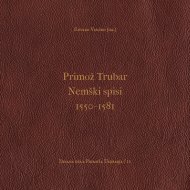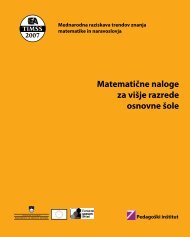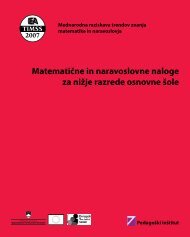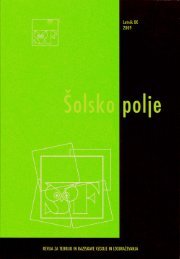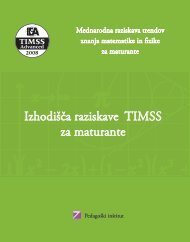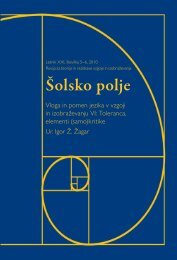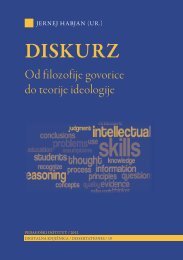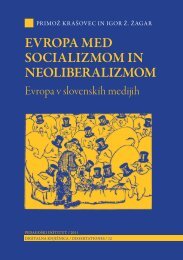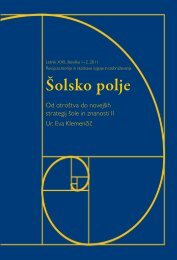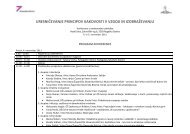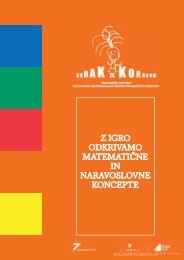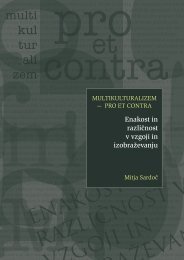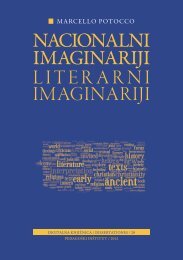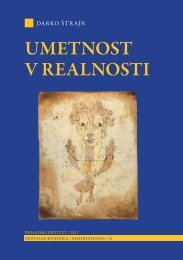92 ŠOLSKO POLJE LETNIK <strong>XX</strong> ŠTEVILKA 5/6Table I. Inclusion of social actors into »we«-groupActor(s) of »we«-group FrequencySerbia 221(Radovan) Karadžić 202Serbian nation 98Serbian government 69Serbian citizens 219. We, the Serbs, have now proven that we respect the international law.Serbian enemies cannot comprehend that the Serbs are successful infulfilling the international requirements. (23 July 2006, TV News)10. We have successfully proven to the International Community that theSerbian nation now meets all the criteria. The processes of modernizationand Europeanization will follow. (22 July 2008, TV News)11. Our strategy is to adopt a process of Europeanization and to preserveSerbian territorial integrity, including Kosovo as a part of Serbia.Our nation will defend Kosovo and will never allow Albanians to stealfrom us this Serbian cradle. (29 July 2006, TV News)12. Velimir Ilić: Despite following the international orders and despitepaying our dues, the EU and the Hague Tribunal treat Serbia unfairly,and this will also happen in the case of Karadžić. Do not have yourhopes up. /…/ Tribunal is destroying Serbia. (30 July 2006, TV News)Similarly, the »them« group was coded in a particular way. As Table II showsthe words »Serbian enemies« were frequently used in order to constructan unspecified and anonymous group of »them«. Van Leeuwen(1996: 51) defines this act as an »indetermination.« In this case, it servesthe purpose of inclusion of different social actors into a group of »Serbianenemies« and, consequently, the construction of a positive »we« group. Inthese binary oppositions, Serbia appears as a »stronger«, »better«, »morevictorious«, »more successful«, i.e. a superior nation. It’s clear here hownostalgia mobilizes unity, registers disappointment with the present byframing »Others« and positing alternative worlds that can exclude.The »them« and the »Hague Tribunal« are constructed as the big »Other«and are both positioned as the main threats to the Serbian identity. They areboth framed as destroyers of the Serbs. Additionally, the Kosovo Albanianscontinue to be the Serbian Other: they are represented as thieves, waiting to»steal« »the cradle of Serbia« (see example 11). They continue to be framedas eternal Serbian enemies (Popov, 2000) and the representation of Kosovo
JOURNALISTIC (RE)PRODUCTION OF HISTORY: TELEVIZED COVERAGE OF RADOVAN ...93as the »cradle of Serbia« continues to remain at the heart of the Serbian nationalisticimaginary (Erjavec and Volčič, <strong>2009</strong>; Popov, 2000).The Hague Tribunal becomes a Serbian »new« Other (see example12) not only because of demands to arrest Karadžić and other military leaders,such as Mladić and Hadžić, but also because Milošević died there.Table II. Inclusion of social actors into »them«- groupActor(s) of “them”-group FrequencySerbian enemies 77The Hague Tribunal 88Kosovo Albanians 63The European Union 59International Community 20The International community and the EU become relatively newly anddifferently represented social actors. In the coverage, the internationalcommunity means different international organizations, such as UN,NATO, The Hague Tribunal and the European Union. International communityand the EU in particular are depicted as not understanding theSerbs and as continuously blackmailing Serbia (for example, Karadžić isnot enough – now Mladić and Hadžić are wanted, too). For the EU, a metaphor»Fortress Europe« is used, pointing to the restrictive laws, policiesand practices resulting in the exclusion of non-citizens.However, this representation is not exclusively negative, since Serbiawants to, at least on the surface, fulfil these requirements and offer full cooperationwith the Hague Tribunal (Torov, 2008). The construction of Serbia’ssuperior status in relation to the International community and the EU is moreimplicit than it is in relation to the other actors, but is visible in TS’s statementsof expectation – Serbia deserves to be rewarded by the EU (see examples 13).13. The arrest of Karadžić means the fulfilment of all EU requirements; it meansa ticket to enter the EU. They demanded that from us… and we fulfilled theobligations, since they told us we cannot even start a negotiation process./.../ we gave them Karadžić, but now they want Mladić! The pressure fromthe EU is even stronger now. /.../ However, Serbia needs to be rewarded forKaradžić’s arrest. (23 July 2008, »Radovan Karadžić – Myth and Reality«)Interestingly, the former Serbian enemies, Bosniaks, formerly one of thecrucial social actors belonging to »them« group during the 1990s wars,were largely ignored during Karadžić’s arrest (see, for example, Erjavecand Volčič, 2007; MacDonald, 2002; Popov, 2000). Despite the fact that TScites three different politicians from BH about Karadžić’s arrest, Bosni-
- Page 3:
VSEBINA LETNIK XX ŠTEVILKA 5/6 Z
- Page 7 and 8:
UVODNA NOTICAIgor Ž. ŽagarTole pi
- Page 9 and 10:
ZA KAJ GRE V KAD - PREGLEDZGODOVINE
- Page 11 and 12:
ZA KAJ GRE V KAD - PREGLED ZGODOVIN
- Page 13:
ZA KAJ GRE V KAD - PREGLED ZGODOVIN
- Page 17 and 18:
ZA KAJ GRE V KAD - PREGLED ZGODOVIN
- Page 19 and 20:
ZA KAJ GRE V KAD - PREGLED ZGODOVIN
- Page 21 and 22:
ZA KAJ GRE V KAD - PREGLED ZGODOVIN
- Page 23 and 24:
ZA KAJ GRE V KAD - PREGLED ZGODOVIN
- Page 25 and 26:
ZA KAJ GRE V KAD - PREGLED ZGODOVIN
- Page 27 and 28:
DISKURZ: FOUCAULT, LACLAU TERZAPOPA
- Page 29 and 30:
DISKURZ: FOUCAULT, LACLAU TER ZAPOP
- Page 31 and 32:
DISKURZ: FOUCAULT, LACLAU TER ZAPOP
- Page 33 and 34:
DISKURZ: FOUCAULT, LACLAU TER ZAPOP
- Page 35 and 36:
DISKURZ: FOUCAULT, LACLAU TER ZAPOP
- Page 37 and 38:
DISKURZ: FOUCAULT, LACLAU TER ZAPOP
- Page 39 and 40:
DISKURZ: FOUCAULT, LACLAU TER ZAPOP
- Page 41 and 42:
DISKURZ: FOUCAULT, LACLAU TER ZAPOP
- Page 43 and 44: DISKURZ: FOUCAULT, LACLAU TER ZAPOP
- Page 45 and 46: DISKURZ: FOUCAULT, LACLAU TER ZAPOP
- Page 47 and 48: DISKURZ: FOUCAULT, LACLAU TER ZAPOP
- Page 49 and 50: TOPOI IN CRITICAL DISCOURSE ANALYSI
- Page 51 and 52: TOPOI IN CRITICAL DISCOURSE ANALYSI
- Page 53 and 54: TOPOI IN CRITICAL DISCOURSE ANALYSI
- Page 55 and 56: TOPOI IN CRITICAL DISCOURSE ANALYSI
- Page 57 and 58: TOPOI IN CRITICAL DISCOURSE ANALYSI
- Page 59 and 60: TOPOI IN CRITICAL DISCOURSE ANALYSI
- Page 61 and 62: TOPOI IN CRITICAL DISCOURSE ANALYSI
- Page 63 and 64: TOPOI IN CRITICAL DISCOURSE ANALYSI
- Page 65 and 66: TOPOI IN CRITICAL DISCOURSE ANALYSI
- Page 67 and 68: TOPOI IN CRITICAL DISCOURSE ANALYSI
- Page 69 and 70: TOPOI IN CRITICAL DISCOURSE ANALYSI
- Page 71 and 72: TOPOI IN CRITICAL DISCOURSE ANALYSI
- Page 73 and 74: TOPOI IN CRITICAL DISCOURSE ANALYSI
- Page 75 and 76: TOPOI IN CRITICAL DISCOURSE ANALYSI
- Page 77 and 78: University of Queensland, Centre fo
- Page 79 and 80: JOURNALISTIC (RE)PRODUCTION OF HIST
- Page 81 and 82: JOURNALISTIC (RE)PRODUCTION OF HIST
- Page 83 and 84: JOURNALISTIC (RE)PRODUCTION OF HIST
- Page 85 and 86: JOURNALISTIC (RE)PRODUCTION OF HIST
- Page 87 and 88: JOURNALISTIC (RE)PRODUCTION OF HIST
- Page 89 and 90: JOURNALISTIC (RE)PRODUCTION OF HIST
- Page 91 and 92: JOURNALISTIC (RE)PRODUCTION OF HIST
- Page 93: JOURNALISTIC (RE)PRODUCTION OF HIST
- Page 97 and 98: JOURNALISTIC (RE)PRODUCTION OF HIST
- Page 99 and 100: JOURNALISTIC (RE)PRODUCTION OF HIST
- Page 101 and 102: JOURNALISTIC (RE)PRODUCTION OF HIST
- Page 103 and 104: THE VOICE OF AN AGENDA-SETTINGAUTHO
- Page 105 and 106: THE VOICE OF AN AGENDA-SETTING AUTH
- Page 107 and 108: THE VOICE OF AN AGENDA-SETTING AUTH
- Page 109 and 110: THE VOICE OF AN AGENDA-SETTING AUTH
- Page 111 and 112: THE VOICE OF AN AGENDA-SETTING AUTH
- Page 113 and 114: THE VOICE OF AN AGENDA-SETTING AUTH
- Page 115 and 116: THE VOICE OF AN AGENDA-SETTING AUTH
- Page 117 and 118: THE VOICE OF AN AGENDA-SETTING AUTH
- Page 119 and 120: THE VOICE OF AN AGENDA-SETTING AUTH
- Page 121 and 122: THE VOICE OF AN AGENDA-SETTING AUTH
- Page 123 and 124: THE VOICE OF AN AGENDA-SETTING AUTH
- Page 125 and 126: THE VOICE OF AN AGENDA-SETTING AUTH
- Page 127 and 128: THE VOICE OF AN AGENDA-SETTING AUTH
- Page 129 and 130: THE VOICE OF AN AGENDA-SETTING AUTH
- Page 131 and 132: THE VOICE OF AN AGENDA-SETTING AUTH
- Page 133 and 134: THE VOICE OF AN AGENDA-SETTING AUTH
- Page 135 and 136: ‘68 KOT HKRATNA KRIZA EVROPSKEGAZ
- Page 137 and 138: ‘68 KOT HKRATNA KRIZA EVROPSKEGA
- Page 139 and 140: ‘68 KOT HKRATNA KRIZA EVROPSKEGA
- Page 141 and 142: ‘68 KOT HKRATNA KRIZA EVROPSKEGA
- Page 143 and 144: ‘68 KOT HKRATNA KRIZA EVROPSKEGA
- Page 145 and 146:
‘68 KOT HKRATNA KRIZA EVROPSKEGA
- Page 147 and 148:
‘68 KOT HKRATNA KRIZA EVROPSKEGA
- Page 149 and 150:
‘68 KOT HKRATNA KRIZA EVROPSKEGA
- Page 151 and 152:
‘68 KOT HKRATNA KRIZA EVROPSKEGA
- Page 153 and 154:
‘68 KOT HKRATNA KRIZA EVROPSKEGA
- Page 155 and 156:
‘68 KOT HKRATNA KRIZA EVROPSKEGA
- Page 157 and 158:
‘68 KOT HKRATNA KRIZA EVROPSKEGA
- Page 159 and 160:
POVZETKI/ABSTRACTSZA KAJ GRE V KAD
- Page 161 and 162:
POVZETKI / ABSTRACTS159NOVINARSKA (
- Page 163 and 164:
POVZETKI / ABSTRACTS161‘68 AS PAR
- Page 165 and 166:
AVTORJI/AUTHORSRuth WodakRuth Wodak
- Page 168 and 169:
166 ŠOLSKO POLJE LETNIK XX ŠTEV
- Page 170 and 171:
168 ŠOLSKO POLJE LETNIK XX ŠTEV
- Page 172:
ZAHVALARevija Šolsko polje izhaja




